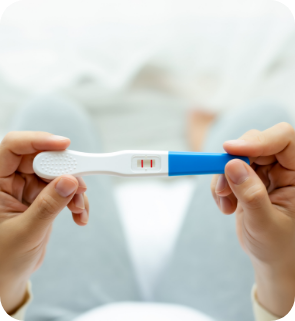
PCOS Weight Loss: The Ultimate Evidence-Based Guide
Jump To
"You should lose weight for your PCOS" is by far the single most common piece of advice given to women with PCOS. Unfortunately, it is never followed up with “and here’s exactly how to lose weight with PCOS”. And therein lies the issue: if losing weight is so great for PCOS then why the heck is no one explaining to women with PCOS how to go about it?
The first reason is that PCOS is a medical diagnosis, meaning that the expert you’re dealing with is going to be a doctor, endocrinologist or gynaecologist. These professionals are experts at what they do (of course), but the issue is that PCOS weight loss has nothing to do with medicine.
The Benefits Of PCOS Weight Loss
The reason that you’ve been told to lose weight for your PCOS is because weight loss or more specifically, fat loss, should help to correct your hormonal imbalances. Importantly, the activities you must do in order to lose weight like eating healthily, exercising regularly should, too, help to balance your hormones thus improve PCOS symptoms.
I always state ‘should’ because PCOS weight loss may not help every woman to correct hormonal imbalances and/or improve PCOS symptoms. It ultimately comes down to your individual case and where your PCOS is rooted.
For some women, the root cause of their PCOS, or ‘PCOS type’, is not affecting or affected by their body weight. So losing weight for these women will not lead to any significant benefit for their PCOS.
Realistically, however, weight loss should help the majority of women with PCOS. Besides, even if you do happen to be in the minority, it is just optimal to be at a healthy body weight - whatever that is for you. Remember, everyone is different.
Studies Show That Losing Weight With PCOS Can:
- Help to reverse insulin resistance
- Lower androgen (testosterone) levels
- Lower inflammation
- Improve mood
- Improve energy levels
For a long time we used to believe that adipose tissue (fat tissue) was pretty much dormant. We now know that fat tissue acts just like any other endocrine gland, meaning that it produces its own hormones. Fat tissue can produce both androgens and estrogen hormones.
The more body fat you have, the more potential there is for your fat tissue to be producing larger amounts of these hormones. And whenever hormones go high or low, you’re going to have issues.
Related: PCOS & Insulin Resistance: Everything You Need To Know
The root cause of all PCOS symptoms is associated with either insulin resistance, excess androgens, and/or inflammation. Because losing weight can help correct all three hormonal imbalances, you can now see why weight loss is such a common treatment strategy for PCOS among medical professionals. And something you’ve probably heard 1,543 times before from them.
SUMMARY:
Studies show that losing weight with PCOS can help to reverse insulin resistance; lower androgen levels; lower inflammation; improve mood; and improve energy levels. specialend
Why Is It So Hard To Lose Weight With PCOS?
Chances are that if you’re reading this, you’ve tried to lose weight in the past and one of two things happened. Either you:
- Tried your best to lose weight but no matter what you did, the scales didn’t budge; or
- You lost some weight but the second you took your foot off the pedal it all came back on a lot faster than you lost it.

This is the battle facing most women with PCOS. Let me explain to you exactly why this happens. For the general public, losing weight is an energy balance. It’s as simple as this: Eat less energy (calories) than you burn each day and you will lose weight.
You see, less energy coming in than going out means your body turns to its backup supply of energy to make up for the missing requirements. What is this backup energy your body has? It’s stored in body fat.
While a person diets they are constantly dipping into this stored backup. It’s like you’re constantly dipping into your savings. If you do that over an extended period of time, what will happen? You go broke! Your savings account starts to look really skinny. The same goes for your body fat stores.
For most people out there, the best way to lose weight has everything to do with energy balance. For women with PCOS, though, losing weight is all about hormonal balance.
This is the most important thing for you to understand because it’s the reason why many women with PCOS struggle to lose weight. Essentially, they take an energy balance approach to a hormonal-based problem.
On the contrary, PCOS weight loss will come naturally when the hormones responsible for weight gain are being balanced. Of course, calories are still important; you must still be in a calorie deficit in order to lose weight.
You cannot simply disregard the first law of thermodynamics - energy in, energy out. But balancing your hormones should be the priority when you are trying to lose weight.
Without further ado, here are the fundamentals for PCOS weight loss, and key evidence-based tips to help you start seeing results.
SUMMARY:
PCOS weight loss is hard because women with PCOS are essentially taking an energy balance approach to a hormonal-based problem. specialend
How To Lose Weight With PCOS: The Fundamentals
Losing weight is a result, a result of actions. For example, for someone to lose 10 kilograms (result) she most likely would have been eating healthily and exercising regularly (actions). Therefore, to lose weight with PCOS you need to:
- Be in a calorie deficit (consume less calories than you burn)
- Be in hormonal balance
You then must set your days up in a way that allows you to enjoy taking the actions required to achieve these two goals. Notice I said enjoy? This is one aspect of weight loss that is never spoken about, unfortunately. The fact is, if you don’t enjoy the process of losing weight, then you’ll lose motivation and quit altogether.
Related: Hormonal Imbalance In PCOS: The Three You Should Be Treating
Enjoyment comes before everything else. It’s a mantra that I cannot emphasise enough. If waking up at 5 am everyday to get down to the gym just isn’t your thing, then it’s not a sustainable, long-term approach to PCOS weight loss.
Instead, if you can find consistency, sustainability and enjoyment in waking up at 8 am, eating a healthy breakfast then doing a little home workout - PERFECT! Remember: Do what you enjoy while ensuring that what you’re doing is both balancing your hormones and keeping you in a calorie deficit.
SUMMARY:
The two fundementals for PCOS weight loss are: Be in a calorie deficit; and be in hormonal balance. specialend
What's The Ideal Calorie Intake To Lose Weight?
We now know how to achieve PCOS weight loss: 1) Be in a calorie deficit, and 2) be in hormonal balance. Now, how do we get there? Let’s start by focusing on achieving a calorie deficit.
Firstly, you need to know what your total daily energy expenditure (TDEE) is. Sounds complicated, but all it is is a rough calculation for how many calories your body burns each day.
Knowing this will help you understand how many calories you should be eating. For example, if your TDEE is 2,000 calories per day (roughly), to be in a calorie deficit you must eat less than 2,000 calories per day. Essentially, this means you will be ‘dipping into your savings’ or fat stores.
SUMMARY:
To know your ideal calorie intake for losing weight, you must first calculate your TDEE. There are plenty of calculators available online, but keep in mind: The figures will be rough estimates. specialend
An Evidence-Based Lifestyle Approach To Losing Weight With PCOS
Nutrition Tips: Best Diet For PCOS Weight Loss (Guidelines)
In terms of diet, the evidence available suggests a range of key guidelines; all of which work incredibly well for my PCOS clients whose goal is to lose weight. They are:
✅ Aim for an average of 50% protein, 25% carbohydrates, and 25% fats for your macronutrient split per day.✅ Ensure your carbohydrates are mostly Low-GI. Great options include rolled oats, sweet potato, brown rice or long-grain white rice, lentils, quinoa, and chickpeas.
✅ Pack your plate full of anti-inflammatory foods like tomatoes, olive oil, green leafy vegetables, nuts, fatty fish, and berries.
✅ Eat regularly, aim for every 3 hours.
✅ If possible, don’t skip breakfast.

Exercise Tips: The Best Workouts To Lose Weight With PCOS
Exercise should be non-negotiable for PCOS weight loss. All forms of exercise will have a metabolic and hormonal result, which means if you choose the right exercises you can restore balance to your symptom-exacerbating hormones.
For example, high intensity interval training (HIIT) exercise helps to turn on hormone-sensitive lipase - an enzyme which helps to gear your metabolism towards fat burning instead of fat storing.
Here are the THREE best types of exercise to lose weight with PCOS:
Resistance Exercise: Resistance training means training with weights - like dumbbells, kettlebells and barbells. It could even be a backpack filled with books! The idea is to help you build lean muscle tissue, which increases metabolism and balances hormones. Ideally, perform between 2-5 resistance sessions per week.
Restorative Exercise: Restorative exercise is anything that is active but helps to heal and restore your mind, body, and soul. Here, we’re referring to activities like slow walking, yoga, stretching, and meditation.
Anything that will help to have a restorative effect on your body. This form of exercise is an effective way to reduce stress. Ideally, you will perform between 1-4 restorative sessions per week for 15 to 45 minutes each.
HIIT Exercise: As we’ve mentioned, HIIT stands for high-intensity interval training and is short (10-20 min) bursts of intense exercise. Things like going all out on the rower machine for 20 seconds followed by a 40 second rest, then repeated for 10 minutes.
Related: The Best Types Of Exercise For PCOS
This type of exercise is my clients’ favourite for PCOS weight loss. An ideal number of sessions per week is 1-2.

Sleep Tips: 7 Ways To Reduce Insomnia To Aid Hormonal Balance
Sleep is the master reset for your entire endocrine (hormonal) system. In fact, many hormones rely on your sleep/wake cycle to function properly, which is a key ingredient for PCOS weight loss. For example, hormones such as melatonin make you feel tired at night when your eyes recognise the fading light.
Other hormones such as aldosterone and antidiuretic hormone ensure that you don't go to the toilet too frequently while you are asleep, for the purpose of keeping you asleep. And when the morning comes, cortisol spikes which helps you wake up from your slumber.
If all goes well and you’ve had sufficient, uninterrupted sleep, many of your hormones will replenish. This affords you optimal energy, immunity, appetite and resilience to face the day’s highs, lows and inbetweens.
Unfortunately, women with PCOS are extremely susceptible to sleep disorders such as sleep apnea or insomnia due to the hormonal environment PCOS creates. In truth, an overall healthy lifestyle should help to improve your sleep, but here are some evidence-backed tips to maximise the quantity and quality of your sleep:
✅ Keep a sleep schedule. This means try to get into bed at the same time each night, even on the weekend. Also, set the alarm for the same time each morning 7 days per week.
✅ At night, turn all the lights off in the house as early as possible; stay off your phone as much as possible, and keep the brightness on your TV down. Remember that melatonin, the hormone that makes you tired, is light sensitive.
✅ Get as much daylight exposure during the day as possible
✅ Avoid napping in the afternoon.
✅ Avoid caffeine (OK in moderation!), alcohol and cigarettes.
✅ Keep your room as dark and cool as possible.
✅ If needed, look into a melatonin supplement - there are plenty out there.
Stress Tips: Reversing Stress To Aid In PCOS Weight Loss
Stress isn't something that a lot of women connect to their PCOS weight gain, but it can be a trigger for this symptom and even exacerbate it. It's important to remember that stress is not just a feeling; it’s an overwhelming cascade of emotion connected to a hormone release (cortisol) that can impact your entire hormonal system.
This means your mood, energy levels, and brain chemistry can all be negatively affected by stress.
When you feel stressed, the adrenal gland produces stress hormones. Cortisol, your primary stress hormone, increases blood sugar levels which, in turn, will increase insulin production.
This is because insulin is released when blood sugar levels rise. Obviously, this has a negative impact on insulin resistance and associated symptoms like ovarian androgen excess, weight gain, poor energy levels, and poor sleep.

High insulin levels, due to insulin resistance, is one of the more common (70%) hormonal imbalances that makes PCOS weight loss very difficult. And because of its commonness, it’s a great place to start in terms of restoring balance to your hormones.
By creating a plan for reducing stress, you are paving the way for balanced insulin levels and decreased insulin resistance.
Here are some evidence-backed, at-home tips to reduce your stress levels daily:
✅ Exercise: Any form of exercise, but restorative has shown to have the biggest impact on stress.
✅ Walk in nature: Listen to your favourite podcast or song, or just listen to the sounds of nature. This can be an incredibly rejuvenating experience.
✅ Daily stretching: Put on some calming music and softly stretch every muscle.
✅ Take a long bath: This is probably the most enjoyable.
✅ Reduce your caffeine intake: Best to consume in the morning, but not in the afternoon.
✅ Practice mindfulness: Try the headspace app if you’re new to mindfulness meditation.
✅ Practice yoga: You don’t have to be flexible to do yoga; find a youtube video, relax and do what you can.
Supplement Tips: Best Weight Loss Supplements For PCOS
Having a science-backed supplement routine is among the best ways to lose weight with PCOS. It can be game-changing. The first reason is, supplements can help to restore balance to your out-of-whack hormones. And like we’ve discussed, being in hormonal balance is fundamental for PCOS weight loss.
The second reason is, PCOS can cause a number of key nutrient deficiencies due to the metabolic and hormonal environment that PCOS engenders.
For example, a large number of women with PCOS are deficient in vitamin D, zinc, magnesium and folate, which are all crucial nutrients for biological processes that are important for PCOS weight loss.
Additionally (as if it weren’t enough already), these deficiencies can cause fatigue, tiredness, frequent sickness, depression, hair loss, and high blood pressure. Here are the best hormonal-balancing weight loss supplements for PCOS.
For general hormonal imbalances, multivitamins will be the best bang-for-your-buck:
✅ Balance (PCOS Multivitamin)
✅ Metabolism, Blood Sugar + Energy; and/or
✅ PCOS Weight Control.

For insulin resistance, stick with well-researched, proven supplements for PCOS:
✅ Inositol (myo-inositol)
✅ N-acetyl cysteine (NAC)
✅ Vitatol (inositol blend)
✅ Berberine.
For androgen (testosterone) excess, focus on supplements specifically for lowering testosterone:
✅ Zinc
✅ Saw palmetto
✅ Spearmint tea extract
✅ Skin + Hair (With Anti-Androgen Complex).
For excess cortisol (stress), focus on proven stress-managing supplements:
✅ Gaba
✅ Chamomile
✅ L-theanine
✅ Passionflower.
To put it all together, I’ll answer a common question that I’m always asked: What is the best way to lose weight with PCOS? An ugly truth is, it may not happen overnight. But PCOS weight loss is not impossible. It only feels impossible because most people take a calorie-only, energy in, energy out approach.
Losing weight becomes far easier when you combine this with a plan to balance your hormones and improve key nutrient deficiencies that PCOS can be responsible for. Remember: Be in a calorie deficit; be in hormonal balance.
Frequently Asked
Losing weight becomes far easier when you combine this with a plan to balance your hormones and improve key nutrient deficiencies that PCOS can be responsible for. Remember: Be in a calorie deficit; be in hormonal balance.
Losing weight becomes far easier when you combine this with a plan to balance your hormones and improve key nutrient deficiencies that PCOS can be responsible for. Remember: Be in a calorie deficit; be in hormonal balance.
Losing weight becomes far easier when you combine this with a plan to balance your hormones and improve key nutrient deficiencies that PCOS can be responsible for. Remember: Be in a calorie deficit; be in hormonal balance.















